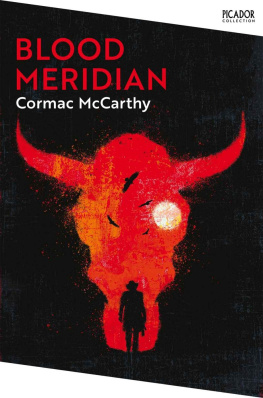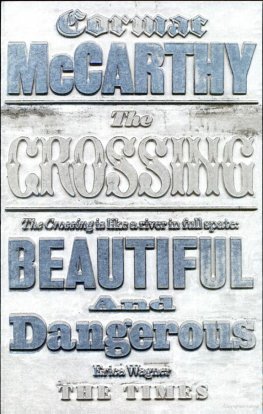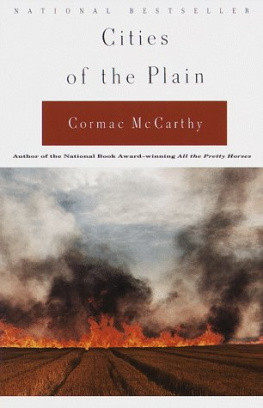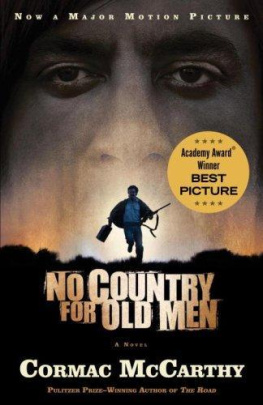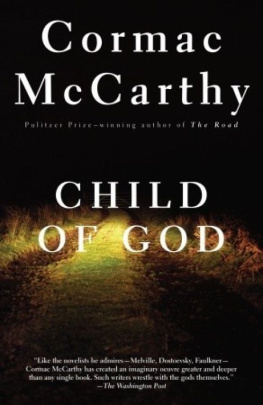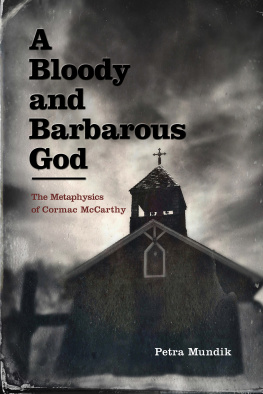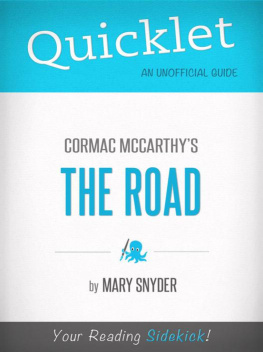BLOOD MERIDIAN
OR
THE EVENING REDNESS IN THE WEST
Cormac McCarthy

Contents
Introduction
T HIRTY YEARS AGO , if youd asked someone to name the most important writers in America, Cormac McCarthy would not have been one of them. His masterpiece, Blood Meridian, had drifted out of print. In fact, all of his books had. McCarthy had lived most of his adult life in near-poverty, shunning publicity, turning down teaching and speaking engagements, andone suspectsguessing his books would not sell much.
McCarthy was born in 1933 and grew up in Knoxville, Tennessee, the son of a prominent lawyer. His family had servants and lived in a big sprawling house; young Cormac likely did not want for much. But, like Ernest Hemingway, who also grew up in comfortable surroundings, McCarthy has never showed any interest in writing about domestic life.
His early works are all set in Appalachia or Tennessee, but in 1976 he moved to El Paso, Texas, on the U.S./Mexico border.
Blood Meridian was the first product of this move. And this bookhis masterpiecemarks both a pinnacle and a turning point in his career. It is the first of his western novels and the last of his darker, meaner books. With one exception, all the books that follow Blood Meridian have a softer edgesympathetic protagonists engaged in sympathetic quests.
Initial reactions were mixed. The New York Times gave this novel a lukewarm review, calling aspects of the book facile, and it sold only a handful of copies. This is not an unusual path for literary masterpieces. F. Scott Fitzgerald was dead by the time The Great Gatsby became popular and it was the same with Melville and Moby Dick. McCarthy, thankfully, has lived long enough to see his work reach its proper standing.
*
McCarthy is in a bit of a strange box. He is the only living writer with a prose style that stacks up against the great modernistsFaulkner, Joyce, Hemingway, and Virginia Woolfand yet he is a very different writer from any of them. He has no interest in internality: we rarely get a sense of what his characters are thinking. We are not privy to their internal or emotional lives. McCarthy is working in an olderperhaps the oldestnarrative register.
When you are judging a literary masterpiece, you are judging first the substance and ideas behind the work. Are they true, are they worth saying, does the book articulate them organically (without talking over the characters) and in a way no one has done before? You are judging the artists ability to capture a world and the people in it and the ability to work in a mode so distinct it can only be hers or his. You would not confuse a Van Gogh with a Rembrandtin fact you would be able to identify both at a glance. At the highest level, prose should be no different.
*
In the conventional sense, the protagonist of this book is a young man called The Kid. He is never given a proper name and for most of the book he is more observer than participant. Dozens of pages pass without him saying a word or having a thought.
The early parts of the book see the kid grow up, develop a taste for mindless violence, and, at fourteen, run away from home. He is shot, stabbed, and beaten, reaches Texas and enlists in a guerilla army which plans (insanely) to invade Mexico. In Mexico, the kid meets up with another guerilla armya group of men hunting Indians for their scalps. In their company, he rides across most of the American Southwest.
At the time the book takes, 18491850, this part of North America was an ungoverned space. The Spanish had been there about three centuries, and, while some Indian tribes had been there several millennia, the two most violent tribesthe Comanche and the Apachewere relative newcomers. The Apache arrived around 1650well after the Spanishand the Comanche even later.
Its worth pointing out that the group of people we monolithically refer to as Native Americans or American Indians were in reality composed of thousands of small nations which had nothing in common except skin color. They spoke hundreds of different languages. Their cultures and societies varied radically: they ranged from pacifistic to extremely violent. Some were farmers, others were engineers, others yet were pure warriors and raiders.
The Comanche and Apache were nomadic warrior tribes. The Comanche in particular treated Mexico the way Europeans treated Africaas a place to capture slaves and other plunder. They would ride down from the north, wipe out a village, and carry off as many horses and captives as they could. The Apache were not much better.
Into this ungoverned spacefought over by the Mexicans, the Americans, the Apache, the Comanche, and various other Indian tribesrode the Glanton gang. Both in real life and in this novel, John Glanton was a former Texas Ranger who was paid to hunt Apaches in Northern Mexico. He led only forty men, but they were heavily armed with advanced weapons. (In 1849, repeating firearms were extremely rareonly a few thousand existed on the entire planetand yet every member of the gang had one.) Glantons aim was to get rich collecting the bounty on Native American scalps that various Mexican states were offering.
*
The two writers McCarthy is most often compared to are Herman Melville and William Faulkner. But, as is commonly the case when comparing great artists, there are more differences than similarities. Faulkners works are deeply internal; McCarthys are almost entirely external. Faulkner is always searching for redemptive qualitiesin his Nobel Prize lecture, he talks about how humans will survive anything (even nuclear war)he was fascinated by the human capacity to overcome and endure. McCarthy holds the opposite view. Both in his novels and in his real life interviews, he is a stern pessimist. He is sure we are all doomed.
In terms of prose style, McCarthy learned and appropriated enormously from Faulkner, though he tends to exceed his mentor in artistic discipline. While on the surface they are working in the same biblical, incantatory register, McCarthy is relentless about keeping the language tight. The sentences might go on for half a page, but every word needs to be there. This is not always the case with Faulkner.
Comparisons to Melville suffer from the same problemhe and McCarthy are not actually that much alike. What they mostly share is a thematic interest in life and death. Both Moby Dick and Blood Meridian are obsessed with the idea of mans destinyor, more precisely, with the question of who among us might control his or her fate.
Both are meticulous with the details of their respective worlds. Moby Dick is a natural history of whaling and life at sea; Blood Meridian is a natural history of the southwest, of horse warfare and combat against the Indians. Every flower is in its proper season, every animal, rock, and tree in its proper place. Even the hallucinations and apparitions are realthe desert in those areas is known for exactly the types of mirages that McCarthy describes.
And yet here the similarities with Melville end. McCarthy wants nothing to do with internality. None of his characters are as developed as Melvilles Ishmaelwe see them only from the outside.
This is a bold choice, given that the thing the novel does better than any other art form is innerness. Giving a sense of human consciousness, the workings of a mind. So if McCarthy leaves out so much of what makes the novel so powerfulindeed, if he leaves out most of what makes human life interestinghow can it be that this book is such a masterpiece?

